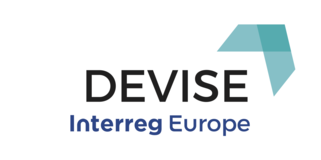DEVISE’s virtual trip to explore project’s additional activities, that will contribute to the improvement of the policy instruments addressed by the partners, continues in the region of Laval (France), where project partners from Laval Mayenne Technopole tell us more about the findings and results of the recently concluded COVID-19 Regional Context Assessment in relation to digital transformation of targeted SMEs and some successful COVID-19 good practices identified.
Our partner from LMT, Valérie Moreau, has no doubts: “the companies that are most advanced in their digital transformation have best withstood the crisis”. Among the findings of the Regional Context Assessment, Valérie explains that there have been deep organisational changes due to the decentralisation of work. Furthermore, LMT has concluded that business models are increasingly based on digital technologies (new ways of communicating, selling, etc.) and they have identified a revival of the economy supported by major investments to integrate new digital tools and uses, in particular to modernise industrial companies. “The crisis has removed the three main obstacles to digital transformation: time, money and corporate culture”, continues Valérie.
Among the consequences of the pandemic, our DEVISE French partner highlights a strong acceleration of the digital transformation of companies to gain resilience (France has gained 7 years), she also outlines the growing disparities with the most backward companies and the new issues that have emerged, such as, lack of skills, data security and privacy issues. According to LMT, the focus should be now on supporting those companies which are lagging behind through awareness-raising, financial aid, support programmes and increasing further use of Artificial Intelligence (AI) or Internet of Things (IoT). They believe that employees should be trained in order to facilitate new skills.
Remote support to companies
Due to the health situation, DEVISE partner LMT offers now remote solutions in order to continue to support the development of start-ups and the digital transformation of SMEs. ‘Online training for start-ups’ is a dedicated platform that includes 18 training videos, podcasts and 12 inspiring news items. “Thanks to this, start-ups have permanent access to a set of quality content that deals with the different stages of their development, providing them with clear and accessible pieces of advice, methods and tools”, states Valérie.
Apart from that, LMT has also created a webinar programme for SMEs of their territory. Our partner mentions that “each month, a one-hour webinar is organised to raise awareness on subjects related to innovation and digital transformation, as well as to train them in tools and methods”. Among other topics, LMT covers themes like ‘How to optimize your referencing and gain visibility?’, ‘Database: how to value them and protect yourself?’ or ‘Data: Presentation of use cases to improve your performance’. “Each webinar brings together about 25 people and during the last year, we organised 10 webinars”, she concludes.
According to Valérie, organising a webinar takes an average of 2.5 days of preparation for 1 person. This includes both the time spent on creating the content that will be presented to the participants, but also communicating about the event. “To-date, 26 people have benefited from the online coaching for start-ups and 132 people have participated in webinars to support the digital transformation of companies”.











